Hundreds of hours' worth of animation is newly available to stream online.
Add a CommentViewing: Blog Posts Tagged with: Chris Landreth, Most Recent at Top [Help]
Results 1 - 8 of 8
Blog: Cartoon Brew (Login to Add to MyJacketFlap)
JacketFlap tags: Cartoon Network, Hasbro, Bill Plympton, Adult Swim, Chris Landreth, Cheatin', Hasbro Animation Studios, Internet Television, Subconscious Password, The Adventures of Puss in Boots, Netflix, Hulu, Add a tag
Blog: Cartoon Brew (Login to Add to MyJacketFlap)
JacketFlap tags: Chris Landreth, National Film Board of Canada, *Promote Video, Cartoon Brew Pick, NFB, Add a tag
A common social gaffe—forgetting somebody’s name—is the starting point for a mind-bending romp through the unconscious.
Add a CommentBlog: Cartoon Brew (Login to Add to MyJacketFlap)
JacketFlap tags: Events, Shorts, Julia Pott, Sundance, Stephen Irwin, Don Hertzfeldt, Chris Landreth, Mikey Please, Emma De Swaef, Marc James Roels, Bernardo Britto, Kelly Sears, Add a tag
The Sundance Film Festival announced that they will launch a touring animation short program next month.
Add a CommentBlog: Cartoon Brew (Login to Add to MyJacketFlap)
JacketFlap tags: Mickey Mouse, Ryan, The Princess and the Frog, Chris Landreth, This Week in Animation History, Add a tag
Blog: Cartoon Brew (Login to Add to MyJacketFlap)
JacketFlap tags: Theodore Ushev, Chris Landreth, National Film Board of Canada, Theo Ushev, Bruce Alcock, Claire Blanchet, Michelle Kranot, Uri Kranot, Events, Shorts, NFB, Add a tag
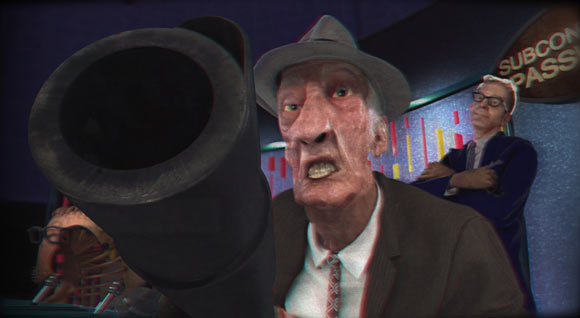
The Ottawa International Animation Festival begins tomorrow in Canada, but fret not for New Yorkers who can’t make it—a small part of the festival experience is coming to you.
On Wednesday, September 25, the National Film Board of Canada will present its latest works, headlined by stereoscopic 3D screenings of Subconscious Password by Oscar-winning director Chris Landreth (Ryan) and Gloria Victoria by award-winning filmmaker Theodore Ushev (Lipsett Diaries, Tower Bawher). Landreth and Ushev will attend the screening to discuss their work. Both of these guys are thoughtful artists whose intelligence shines through their work. Their films are always worth seeing and these new works are no exception.
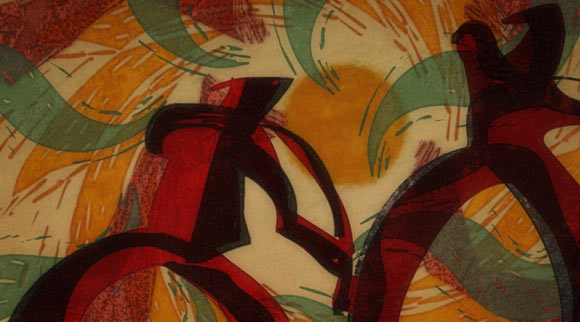
The screening, which is co-sponsored by ASIFA-East and Dimitris Athos of BeFilm, will also include presentations of the following films: Hollow Land by Michelle and Uri Kranot (Dansk Tegnefilm/Les Films de l’Arlequin/NFB), The End of Pinky by Claire Blanchet and Impromptu by Bruce Alcock (Global Mechanic Media/NFB).
The event will take place at the Park Avenue Screening Room (500 Park Avenue at 59th Street). Entry is FREE, but it’s open only to current ASIFA-East members. Tickets are limited and seats must be reserved.
Add a CommentBlog: Cartoon Brew (Login to Add to MyJacketFlap)
JacketFlap tags: Ideas/Commentary, Nick Park, documentary, Audition, Ryan, Wonderland, Aardman Animations, Windy Day, Chris Landreth, John Hubley, Peter Lord, Creature Comforts, Faith Hubley, Waltz with Bashir, Animated Conversations, Audio production, Colin Thomas, Confessions of a Foyer Girl, David Sproxton, Down and Out, Hangovers, Jonathan Hodgson, Moonbird, Orly Yadin, Sylvie Bringas, The Trouble with Love and Sex, William Mather, Add a tag
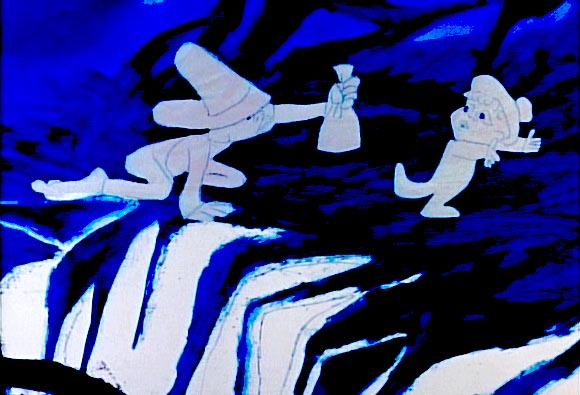
One of the better-known shorts made by John and Faith Hubley is Moonbird, from 1959. This film came about when the Hubleys made a secret recording of their two sons one night, playing a game in which they pretended to be hunting for the elusive Moonbird. The result was a soundtrack with a complete narrative, courtesy of the two children; the Hubleys and their studio then visualised the story to create the film.
It is surprising how well Moonbird works, considering that its story is simply two kids making things up as they go along. The personalities of the children come through very strongly and much of the recorded dialogue is inherently funny, as when the younger boy tries to recite “Hey Diddle Diddle” but has trouble remembering past the second word.

Moonbird was followed by the 1967 film Windy Day, based on the same concept but using the voices of the Hubleys’ two daughters. This short is much looser, with a transformative element as the two characters morph from one identity to another. Instead of a single narrative, the children deliver a free-flowing conversation which makes several twists: The two girls start by playing at being a knight and a princess, and later play at being animals; between these sessions they discuss birth, adulthood, marriage and death in the half-grasped manner of children.
Windy Day was shown at the 1968 Cambridge Animation Festival; amongst the people who saw it were producer Colin Thomas and animator William Mather.
“We were blown away by the use of raw unpolished sound with a highly controlled medium like animation”, said Mather in an interview I conducted with him in 2011. In 1975 the two put together a pilot film entitled Audition, based around a recording of Mather’s son talking to an organ player as he auditioned for the role of a choirboy.
The film is very different to Hubley’s shorts. Aside from a very brief sequence in which the boy imagines the organ turning into a monster, it does not take place in a world of childhood fantasy: Its aim is instead to recreate the conversation in more straightforward cartoon terms.
The Hubleys sought to create fantasy films when they made Moonbird and Windy Day, and turned to the taproot of so much fantasy: the imaginations of children. By contrast, Mather and Thomas created a film which was closer to documentary. It is worth noting that Thomas was a documentary filmmaker, and that BBC Bristol – the branch for which the two men made their pilot – has a strong documentary tradition.

The pilot led to Animated Conversations, a six-part series produced in the late-1970s by various directors. Mather contributed Hangovers, based on a recording of a barmaid and her customers, but the best-known shorts for this series were made by Aardman founders Peter Lord and David Sproxton.
The two Aardman shorts take quite different approaches. Down and Out is a literalistic portrayal of an elderly man being turned away from a hostel which – unlike Mather’s shorts – lacks any humor; its emphasis is instead on pathos. Confessions of a Foyer Girl, on the other hand, plays its material for laughs. A young cinema employee discussing the banal details of her day-to-day life is contrasted with the glamorous and exciting world of the movies.
Lord and Sproxton’s work on Animated Conversations prompted Channel 4 to commission its own series of animation based on natural dialogue, this time made entirely by Aardman: Late Edition, Sales Pitch, On Probation, Early Bird
and Palmy Day. As before, some of these went for wacky comedy, while others opted for melancholy tones.
Aardman’s subsequent work in this format includes Creature Comforts by Nick Park. As well as ranking as the single most famous example of the approach, it is one of the more playful in using its soundtrack. As the film is framed as a series of short interviews with various characters, Park was able to home in on the soundbites with the most comic potential. The earlier shorts built themselves around large chunks of undigested conversation, but the whole point of Creature Comforts is that the interviewees are quoted completely out of context.
Creature Comforts became an entire franchise, and in is now the key example of what is, today, a full-fledged genre of animation.
Sometimes the approach can serve a practical use. Animation students are often assigned the task of working to found soundtracks as lipsync exercises. “The Trouble with Love and Sex,” a 2011 episode of the BBC documentary series Wonderland, focused on people undergoing counselling; when it ran into the problem that these people were not comfortable being filmed, it simply used their voices, the visuals being animated by Jonathan Hodgson.
Meanwhile, other animators returned to the daring ethos of the Hubley shorts. Chris Landreth’s Ryan plays with intertextuality, using animation to illustrate interviews with and about animator Ryan Larkin. Sylvie Bringas and Orly Yadin’s’s Silence presents a child’s eye view of the Holocaust, alternating between harsh, woodblock-like sequences for the camp scenes and a softer, more childlike style for the postwar sequences.

There are three general approaches taken by these films. The first is a literalistic portrayal of the conversation, as with the melancholy Down and Out, the lighthearted Late Edition and the harrowing Waltz with Bashir (the last of these being the only feature-length animation of this type that I am aware of.) The second approach creates comedy by placing ordinary dialogue into an unusual situation, as with Creature Comforts.
Finally, the third approach uses animation to illustrate the more subjective aspects of the soundtrack, usually by attempting to recreate the mental state of the speaker. Examples include Silence, Ryan, Marjut Rimminen’s Some Protection, Paul Vester’s Abductees and Andy Glynne’s Animated Minds.
Jan Svankmajer once remarked that “animators tend to construct a closed world for themselves, like pigeon fanciers or rabbit breeders.” When an animated film uses unscripted audio, what we see is pure fantasy, but what we hear is an actual moment in time—the closed world of animation is suddenly opened up to stark reality.
IMAGES AND VIDEO IN THIS PIECE
1.) Still from Moonbird
2.) Still from Windy Day
3.) Audition
4.) Still from Confessions of a Foyer Girl
5.) Still from Creature Comforts
6.) Clip from “The Trouble with Love and Sex”
7.) Still from Waltz with Bashir
Blog: Cartoon Brew (Login to Add to MyJacketFlap)
JacketFlap tags: Festivals, Super, Bill Plympton, Eric Goldberg, Kickstarter, Chel White, John Dilworth, Chris Prynoski, Michaela Pavlatova, Chris Landreth, Serge Bromberg, Monsters University, Crowdfunding, Dan Scanlon, Cheatin', Blue Umbrella, Saschka Unseld, Annecy International Animated Film Festival, Bill Kroyer, Subconscious Password, Annecy Plus, Betty's Blues, Dominique Puthod, Drunker Than a Skunk, Johan Klungel, Lucas Plympton, Marcel Jean, Remi Vandenitte, Sandrine Plympton, Add a tag
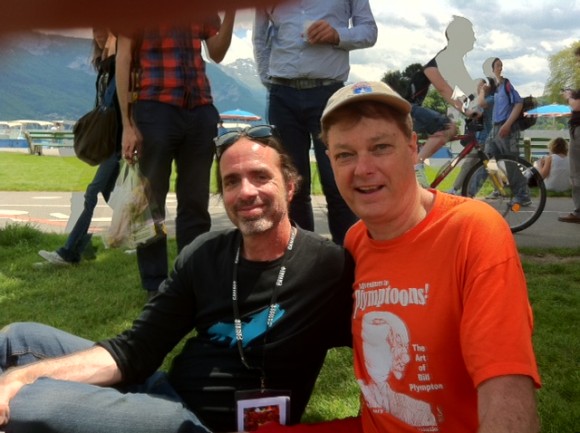
Bill Plympton with Chris Landreth
BILL PLYMPTON is the Oscar-nominated filmmaker of seven animated features and more than thirty animated shorts. His new feature Cheatin’ will premiere this fall. Learn more about his work at Plymptoons.com.
I went to Annecy with mixed emotions this year—after all, it was a year of major changes.
The iconic Bonlieu Centre, where all the action usually takes place, was being torn down to be replaced by a larger and hopefully more beautiful structure. Some say the new theater complex will be finished next year and some say in two years—who knows, with French construction workers.
The other new kink was the fact that celebrated artistic director Serge Bromberg was leaving after fifteen wonderful years, to be replaced by Marcel Jean. So, naturally, I felt that this would be a transitional year.
My wife Sandrine and I arrived just in time to go to the opening night event, taking place in the freshly-constructed hybrid tent cinema. The opening film was the long anticipated Pixar sequel Monsters University, directed by Dan Scanlon, along with the new Pixar short Blue Umbrella. The latter six-minute short by Saschka Unseld had a very different look from all of the former Pixar shorts, a lot more realistic, and the love story involving two colored umbrellas in a rainstorm has certain similarities to last year’s Oscar winner, Paperman.
Monsters University was a bit disappointing—for me there were too many extraneous characters to get emotionally involved, and the colors, especially the backgrounds on the campus grounds, were too neon-bright, which made it hard to enjoy the beautiful design and follow the characters.
The next morning I had a panel about crowdfunding and Kickstarter. Like a similar panel I hosted at Stuttgart, it was a packed house. After years of sucking off the government teat, the Europeans are mad for a more democratic, and perhaps hassle-free, way for raising money to make films.
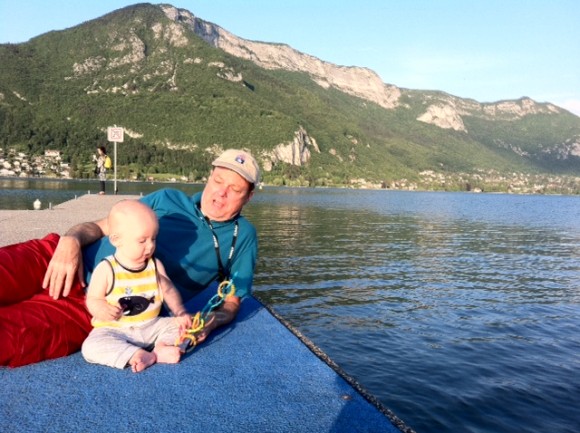
Bill Plympton with his son Lucas Plympton
Tuesday afternoon was the Competition Shorts creening #2, and my film Drunker Than a Skunk was in that group, so Sandrine and I needed to attend to present the film. The program started off promisingly enough—meaning that the films were not that good and hence the audience would love our film. All the early films in the program were abstract or avant-garde, therefore not crowd-pleasers. Then came Remi Vandenitte’s Betty’s Blues, a wonderful ode to Southern blues music that had a terrific style. Then Drunker came on and we received a very nice reaction. We felt we were looking good for Awards Night.
But, later in the program, came Chris Landreth’s unmemorably named Subconscious Password, a totally delightful and bold CG film starring Chris and the enigmatic John Dilworth. Then and there, I knew our awards chances flew out the window. Oh well, once I knew I didn’t have to worry about awards, I could just enjoy the week and relax.
My next event was a work-in-progress screening of my new feature, Cheatin’. There was a really good buzz going about this film, so tickets were hard to get and a lot of people asked me to sneak them in.
I showed some pencil tests and finished scenes, drew some of the character designs and talked about the production. The audience applauded throughout (which I loved) and then I moved to a table just outside the exit, next to a beautiful creek, and gave everyone in line a free sketch, which took about an hour.
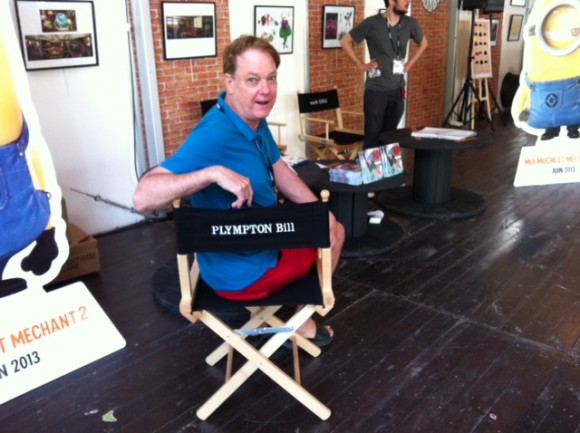
For the past seven years, I’ve been presenting the “Annecy Plus” show, first with Pat Smith, and now with Nik and Nancy Phelps. It’s been a smashing success. This year, we were forced to relocate the popular event to the wonderful Café des Arts in Old Town. We promoted the hell out of it, and the weather was perfect so we had high hopes for a big success. Unfortunately, there was no movie screen!
Jonas Raeber, the projectionist and sound man, was able to “borrow” two large sheets from his hotel. Another problem: the door with access to the balcony, where we wanted to hang the sheets, was locked with no key. So, a drunk Indian animator volunteered to leap from an open window across to the balcony—a real Jackie Chan-type moment. I had visions of a terrible accident, and me spending three years in French courts fighting a lawsuit, but the dashing Indian succeeded, and he had free beers all night.
Nik Phelps and his band kicked off the evening with some lively music, and we began the show. Then, the next tragedy struck. Even though Virginia, the proprietor of the bar, had received permission from the city council to hold a late-night screening, there was a rave the night before and it created such a ruckus that her permit was revoked. Thus, we had to turn the sound off at 10p.m., and the problem with that was that it didn’t get dark until 9:30. As a result, the audience only heard one out of the four programs—the last three were silent. Quel dommage.
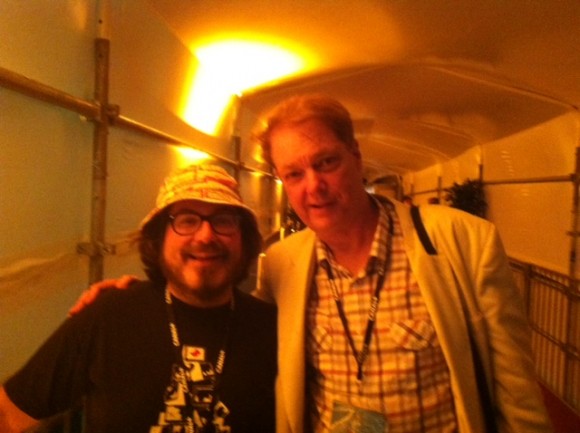
Bill Plympton with Titmouse’s Chris Prynoski
However, there was enough beer and wine for everyone, and a good time was had by all. The Annecy Plus winning film, by the way, was Super by Johan Klungel. As for the main Annecy awards show, it was a happy affair with nice weather, and Serge showed up to give out the awards with Marcel Jean. The big winner of the evening, and justifiably so, was Subconscious Password by Chris Landreth. He gave a fantastic speech, then we all went to party at the Palais, where I visited with Eric Goldberg, Bill Kroyer, Chris Prynoski of Titmouse Studios, Dominique Puthod (the president of the festival), Chel White, and Michaela Pavlatova, last year’s winner with Tram.
The best news was that everyone was talking about Cheatin’, so chances are good it will be in competition next year in Annecy. See you all there!
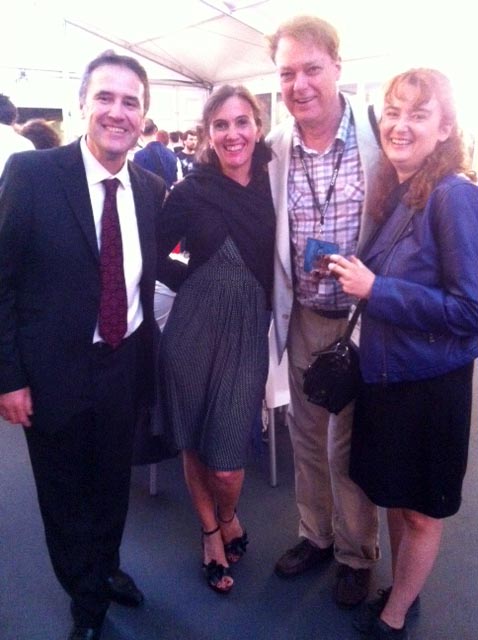
Dominique Puthod (Annecy Festival President), his wife Catherine, Bill and
Sandrine Plympton
Blog: Cartoon Brew (Login to Add to MyJacketFlap)
JacketFlap tags: Awards, Feral, Theodore Ushev, Annecy, Room on the Broom, Chris Landreth, Rosto, Daniel Sousa, Ainslie Henderson, I Am Tom Moody, Annecy International Animated Film Festival, My Mommy is in America and She Met Buffalo Bill, O Apóstolo, Rio 2096: A Story of Love and Fury, Alexey Alekseev, Anna Budanova, Dumb Ways to Die, Fernando Cortizo Rodriguez, Gloria Victoria, Jan Lachauer, Julian Frost, KJFG No 5, Lonely Bones, Luiz Bolognesi, Marc Boréal, Max Lang, Subconscious Password, The Wound, Thibaut Chatel, Add a tag

The <Annecy International Animated Film Festival, which concluded on June 15th, awarded its Cristal prize for feature to the Brazilian film, Rio 2096: A Story of Love and Fury. The festival’s Cristal for short film went to the NFB short Subconscious Password, a CG/pixilation effort by Oscar-winner Chris Landreth (Ryan).
The complete list of winners is below:
The Cristal for best feature
Rio 2096: A Story of Love and Fury
Directed by Luiz Bolognesi (Brazil)
The Cristal for best short
Subconscious Password
Directed by Chris Landreth (Canada)
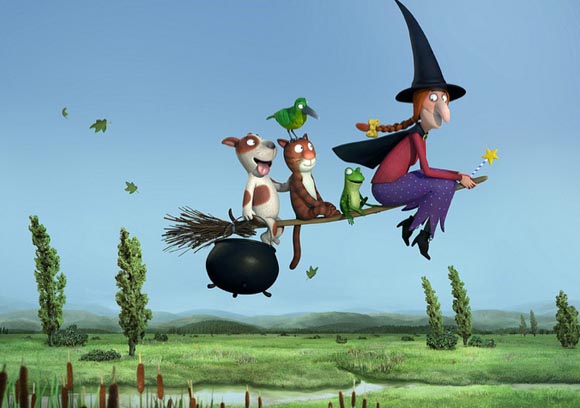
The Cristal for best TV production
Room on the Broom
Directed by Jan Lachauer and Max Lang (Great Britain)
The Cristal for best commissioned film
Dumb Ways to Die
Directed by Julian Frost (Australia)
Feature Films: Special Distinction
My Mommy Is in America and She Met Buffalo Bill
Directed by Marc Boréal and Thibaut Chatel (France/Luxembourg)
Feature Films: Audience Award
O Apóstolo
Directed by Fernando Cortizo Rodriguez (Spain)
Short Films: Special Jury Award
The Wound
Directed by Anna Budanova (Russia)
Short Films: Distinction for a first film
Trespass
Directed by Paul Wenninger (Austria)
Short Films: Jean-Luc Xiberras Award for a first film
Norman
Directed by Robbe Vervaeke (Belgium)
Short Films: Special Distinction
The Triangle Affair
Directed by Andres Tenusaar (Estonia)
Short Films: Sacem Award for original music
Lonely Bones
Directed by Rosto (The Netherlands)
Short Films: Junior Jury Award
Feral
Directed by Daniel Sousa (USA)
Short Films: Audience Award
Lettres de femmes
Directed by Augusto Zanovello (France)
TV: Special Award for a TV series
Tom & The Queen Bee
Directed by Andreas Hykade (Germany)
TV: Award for best TV special
Poppety in the Fall
Directed by Pierre-Luc Granjon and Antoine Lanciaux (France)
Commissioned films: Special Jury Award
Benjamin Scheuer: “The Lion”
Directed by Peter Baynton (Great Britain)
Graduation Films: Award for best graduation film
Ab ovo
Directed by Anita Kwiatkowska-Naqvi (Poland)
Graduation Films: Special Jury Award
I Am Tom Moody
Directed by Ainslie Henderson (Great Britain)
Graduation Films: Special Distinction
Pandas
Directed by Matus Vizar (Slovakia)
Graduation Films: Junior Jury Award
Rabbit and Deer
Directed by Peter Vacz (Hungary)
Unicef Award
Because I’m a Girl
Directed by Raj Yagnik, Mary Matheson, and Hamilton Shona (Great Britain)
Fipresci Award
Gloria Victoria
Directed by Theodore Ushev (Canada)
Fipresci Special Distinction
Feral
Directed by Daniel Sousa (USA)
“CANAL+ creative aid” Award for a short film
Autour du lac
Directed by Carl Roosens and Noémie Marsily (Belgium)
Festivals Connexion Award – Région Rhône-Alpes with Lumières Numériques
Feral
Directed by Daniel Sousa (USA)
The Funniest Film according to the Annecy Public
KJFG No 5
Directed by Alexey Alekseev (Hungary)


